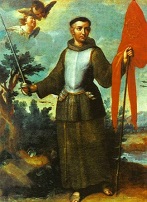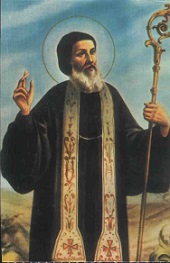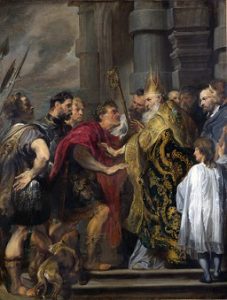
Saint Richard of Chichester
Feast April 3
Archbishop of Canterbury (1197-1253)
Saint Richard of Chichester was born in 1197 in a little town a few miles from Worcester, England. He and his elder brother were left orphans while still young, and his brother was imprisoned as a result of their property’s unpaid debts. Richard gave up the studies which he loved, to farm his brother’s impoverished estate. His brother, in gratitude for Richard’s successful labors, proposed to turn over to him all his lands; but he refused both the estates and the offer of a brilliant marriage, to study for the priesthood at Oxford.
In 1235 Saint Richard was appointed, for his learning and piety, chancellor of that University and afterwards chancellor of his diocese by Saint Edmund, Archbishop of Canterbury. The new Chancellor stood by the Saint in his long contest with the king, and then accompanied him into exile in France, in the Abbey of Pontigny. After Saint Edmund’s death there, he studied theology in Orleans before returning to England to toil as a simple parish priest. He was, however, soon elected by the Canons of Chichester, when their see became vacant, for their Bishop. This election greatly displeased the king, who had nominated another candidate whom the Canons judged unworthy.
The king in revenge refused to recognize the election, and seized the revenues of the see. Thus Saint Richard found himself fighting the same battle in which Saint Edmund had died. He went to Lyons, where he was consecrated bishop by Innocent IV in 1245, and returning to England he exercised fully his episcopal rights despite his poverty and the king’s hostility, and thoroughly reformed his see. Young and old loved Saint Richard, and after threatening the king with excommunication his revenues were restored.
Richard was merciless to usurers, corrupt clergy and priests who mumbled the Mass. At the same time, he was an ascetic who wore a hair-shirt and refused to eat off silver. To feed the poor and heal the sick, he gave all he had and worked miracles; and when the rights or the sanctity of the Church were concerned, he was inexorable.
A priest of noble blood polluted his office by sin; Richard deprived him of his benefice, and refused the king’s petition in his favor. On the other hand, when a knight violently imprisoned a priest, Richard compelled the knight to walk around the priest’s church with the same log of wood on his neck to which he had chained him. And when the burgesses of Lewes tore a criminal from the church and hanged him, Richard made them dig up the body from its unconsecrated grave, and bear it back to the sanctuary they had violated. Richard died in 1253 while preaching, at the Pope’s command, a crusade against the Saracens.
References and Excerpts
[1] “Lives of the Saints, St. Richard of Chichester,” Magnificat, 13 July 2013. [Online]. Available: https://magnificat.ca/cal/en/saints/sai … ester.html. [Accessed 2 April 2016].



